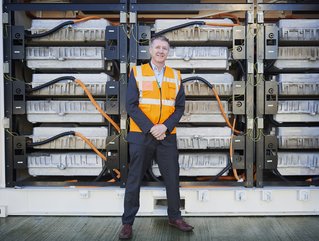Connected Energy targets utilities after £15mn investment

Connected Energy is set to scale up in the utilities sector after securing £15mn from five investors.
Caterpillar Venture Capital Inc., the Hinduja Group, Mercuria, OurCrowd and Volvo Energy have joined existing investors Engie New Ventures, Macquarie, and the Low Carbon Innovation Fund.
Connected Energy is one of only a handful of companies to have proven that second life vehicle batteries can be used in commercial battery storage systems, providing environmental benefits.
Alongside its Newcastle upon Tyne HQ, operations site at Cranfield University in Bedfordshire and Technical Centre in Norfolk, it has 16 operational systems across Europe, including Belgium, Germany and the Netherlands. In Germany, its units are helping to balance energy supply with EV chargers used on either side of the motorway.
This next investment phase will enable Connected Energy to scale up its technology and operations in response to a growing energy storage market and increasing international availability of second life batteries.
It will also facilitate the in-house development of the company’s first large scale M-STOR system which is planned to be around 20MW and 40MWh, employing a contracted ‘flow’ of batteries from multiple OEMs to provide long term operational services to customers.
With an estimated 6.7mn pure EVs operational worldwide and 34.7mn predicted globally by 2030, the potential for battery reuse is vast, as is the need to ensure the resources in the batteries are used effectively. With this investment Connected Energy aims to scale up its business to utilise a predicted ramp-up in second life battery availability in 2024/25.
CEO Matthew Lumsden said when batteries are around 25% degraded they are often considered unsuited to life in a vehicle but still have sufficient capacity for up to 10 years’ more use in a battery energy storage system (BESS).
Over its lifetime in operation, a second life BESS can save an additional 450 tonnes per MWh of CO2e compared to using first life lithium-ion batteries, figures which explain the appeal of Connected Energy to investors and customers keen to support carbon reduction targets with meaningful action.
Supporting the use of renewable energy sources, battery energy storage has been described as the ‘true bridge to a clean energy future’, and the UK is one of the fastest growing markets in the world. In 2020 capacity increased from 1.7GW of grid-connected battery storage to a planned 13.8GW in 2021, and revenue per MW hour doubled over the same period from £63k per MW £123k per MW hour.
Connected Energy aims to grow second life battery industry value chain
Rising fuel prices have caused many organisations to consider the use of energy storage to reduce costs, increase self-consumption and generate new revenue as well as solve problems such as supply constraints. As a consequence, Connected Energy has already booked more projects in the first three months of 2022 than in any previous year.
“In order to grow the second life battery industry, strong pan-value chain relationships will be critical to Connected Energy as it expands, and the company’s new investors will complement this effort,” said Lumsden.
“This marks a key gateway for our business. Our group of investors now span battery supply through to project deployment and monetisation, and critically this will enable us to plan and manage technology and project development to maximise the volume of batteries that are redeployed in second life applications.”
Joachim Rosenberg, President Volvo Energy said there is a great deal of untapped potential in the second-life use of batteries.
"This forward-leaning investment aims to facilitate the scaling-up of second-life battery energy storage systems and further secure circular business opportunities for the forthcoming ramp-up in Volvo Group’s second-life battery returns," he said.
“Together with Connected Energy, we will minimize the environmental impact of the batteries that has powered Volvo Group applications. By repurposing the batteries, we obtain the full value from them – from a climate, environment and business perspective.”
Jihad Salahuddin, Caterpillar Senior Investment Manager, CVCI said Connected Energy’s technology to repurpose EV batteries has demonstrated strong promise in terms of its current performance and upside capabilities. "We see it as an important element of our strategic roadmap in the battery circular economy and our long-standing Enterprise commitment to sustainability.”
Alexis Flandre, Managing Director of Energy Transition at Mercuria, said amid the rapid electrification of the transport sector and the growing intermittent renewable sources of power supply, it is joining with Connected Energy to provide needed sustainable flexibility solutions in energy markets, and will bring its power trading and battery metals supply chain expertise.
Turquoise International, UK’s leading ClimateTech merchant bank, acted as corporate finance adviser to Connected Energy in the fundraising.






